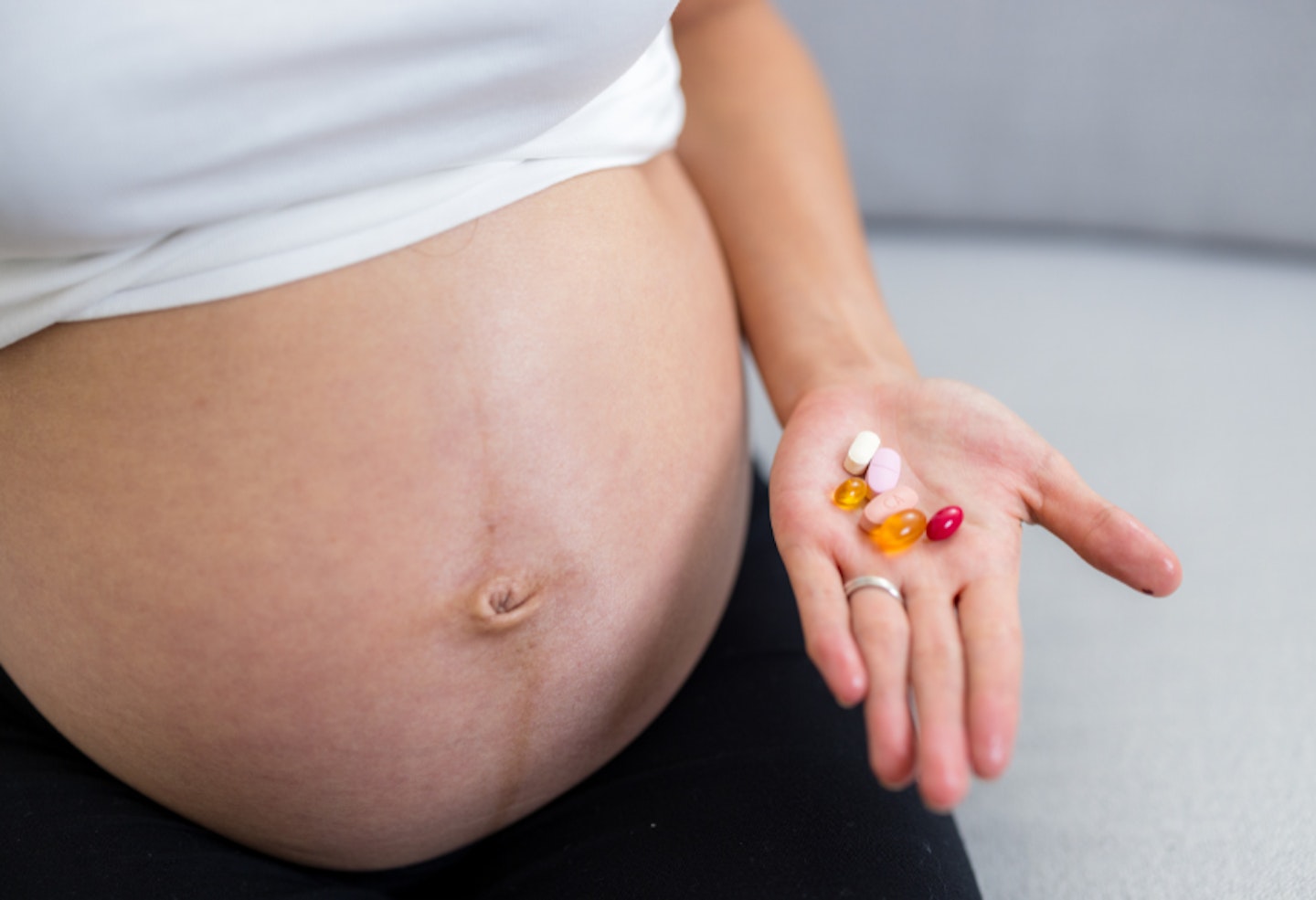We all know about the importance of folic acid, but when it comes to other supplements, such as probiotics in pregnancy, it can be hard to know what’s safe and recommended. A new study suggests a link between the positive changes a probiotic supplement can have on a mother’s gut health, and various health benefits for both mum and baby. We’ve spoken to the experts to discover if probiotics could be a good addition to your daily supplement and pregnancy vitamins routine.
Why does gut health matter during pregnancy?
Gut health feels like it’s never out of the press, but it’s a fairly recent field of research – and, as is often the case – there’s a lack of data around probiotics in pregnancy. That’s why a new study from researchers in Cambridge on Science Daily is so welcome: it has demonstrated the importance of a mother’s gut health during pregnancy for her baby’s brain development. This study, which admittedly was carried out on mice rather than people, provides an early suggestion that taking a probiotic supplement (specifically Bifidobacterium breve) could help with the transportation of nutrients to a baby’s brain as well as benefits to other cell processes too. And it’s got people excited! ‘The study adds to the evidence base that is building which suggests that improving maternal gut health could be a non-pharmaceutical approach to supporting foetal brain development, potentially reducing the risk of conditions like cerebral palsy, autism, and schizophrenia,’ says Dr Melissa Bujtor, Consultant, Registered Human Nutritionist (RNutr) and Paediatric Feeding Specialist at Lifespan Nutrition. There are of course limitations to the research that mean human studies need to be done before we can be certain about the role of probiotic supplements in pregnancy. But many medical and nutrition experts believe that maternal gut health is a key area of health for developing babies. ‘We are still trying to understand the intricacies of the relationship between gut and health, but as we learn more, we are realising that it is a very important component of health, including in pregnancy,’ says Dr Bujtor.

How could probiotics help during pregnancy?
Probiotics – live bacteria and yeasts that form your gut microbiome and support your digestive system, amongst other things – are an important element of gut health, and can be consumed both as food (generally fermented) and as supplements. While the evidence supporting probiotic supplements, or friendly bacteria, during pregnancy is yet to be firmed up, there’s no doubt that a healthy gut helps offer your baby a great start. ‘Having a well-balanced, diversified gut microbiota to offer up to your infant may positively influence their short and long-term development, health, and well-being,’ says Dr Bujtor.
There are various ways your gut might be involved throughout your baby’s development. ‘The bacteria in a mother's gut can be passed to the baby during early life, which may help with their immune, cognitive development, foetal neurodevelopment, metabolic system development, and allergic disease,’ says Star Freudenberg, an Integrative Gut Health and Wellness Biohacker and Naturopath from Star Freud Wellness Clinic. ‘It could also improve the growth and development of the baby during pregnancy and reduce the risks of birthing complications of premature birth.’ And the benefits aren’t just for baby: ‘For the mother, having a strong gut microbiome can prevent common complications arising such as gestational diabetes and preeclampsia which causes high blood pressure and preterm birth,’ says Star. ‘A healthy gut can help prevent common pregnancy discomforts like bloating and constipation which are common complaints during pregnancy.’ In addition to taking a probiotic supplement, there are lots of other ways to improve your gut health – from lowering stress to regulating your sleep,
and following a healthy diet.
Are probiotics safe to take during pregnancy?
Many experts believe a probiotic supplement is a sensible addition to the usual pregnancy supplements, with the obvious caveat that you should first consult your doctor or midwife, or a registered nutritionist or dietician. There may well be benefits for you and your baby to include probiotics during pregnancy, but the science is quite new, so it’s worth speaking to an expert first.
What’s the best probiotic supplement for pregnancy?
If you’ve decided to start taking probiotics during pregnancy, it’s a case of finding the slipper that fits: ‘An individual’s microbiome is unique like a fingerprint and thus getting an appropriate probiotic needs to be managed under the guidance of a professional who understands the different strains and what is more suitable based on the need.’ She points out that the recent study – while welcome research – has only examined one possible strain of probiotic: ‘It’s great that they have experimented on the power of only one type of probiotic, but it needs to be noted that there are over 500 different types of probiotic species with thousands of specific strains. The strain of a probiotic determines its health benefits, so even if two probiotics have the same genus, they may have different strains that offer different benefits.’
What does the NHS say about probiotic supplements during pregnancy?
There isn’t specific guidance from either the NHS or within NICE guidelines about probiotic supplements during pregnancy, and as always it’s worth discussing with your GP, midwife or pharmacist before taking any supplements. ‘Current advice indicates pregnant women should consider dietary intake first,’ says Dr Bujtor. ‘Indeed, eating a well-balanced, nutrient rich diet will encourage microbiome health and diversity, and there is no need to take a supplement.’

What about eating probiotic food during pregnancy?
If you’re keen to introduce probiotic food into your diet, foods such as kefir, yoghurt and kimchi are all good options for nutrition during pregnancy with probiotics. Although of course the usual pregnancy rules apply, so for example, dairy must be pasteurised and you shouldn’t include blue cheeses. Prebiotic foods – which encompasses a huge range of plant-based foods – are also important, as they contain compounds that feed and nurture your healthy gut organisms. ‘To date, little research has been conducted examining diet during pregnancy with respect to the gut microbiome of the mother, or what impact the mother’s gut microbiome state would have on the infant,’ says Dr Bujtor. But there has been some research, and are suggestions about what to prioritise: ‘High-fat diets have been associated with a reduction in microbial diversity of the mother, which negatively impacts overall health and well-being of both the mother and the infant. While fibre intake may be positively associated with microbial diversity.’ So most pregnant folk should keep the percentage of fat – particularly saturates – low in their diet, and fibre levels high for optimum gut health.
Dr Bujtor recommends: ‘A diverse, fibre-rich diet that includes a variety of vegetables, fruits, whole grains, legumes, and beans is key to supporting beneficial gut bacteria' Fermented foods such as yogurt, kefir, sauerkraut, kimchi, miso, and tempeh are excellent sources of natural probiotics, which can help maintain gut balance. ‘Incorporating prebiotic-rich foods like garlic, onions, asparagus, artichokes, and bananas further nourishes these beneficial bacteria. Additionally, limiting processed and high-sugar foods, staying hydrated, including omega-3-rich foods like fatty fish, chia seeds, and flaxseeds, and maintaining regular meal and sleep patterns can all contribute to a thriving gut microbiome.’ Whether or not you take a probiotic supplement, everyone agrees that considering your gut health is a great way to improve your chances of a healthy, happy pregnancy.
Lizzy Denning is a freelance journalist, editor and web editor. She has been published by The Guardian, Mail Online, The Observer, Grazia, Marie Claire, Elle, Cosmopolitan, Heat, Women’s Health, the Huffington Post, the Pool, and others. She writes mostly about travel, fitness, women’s rights, opinion pieces and film.
